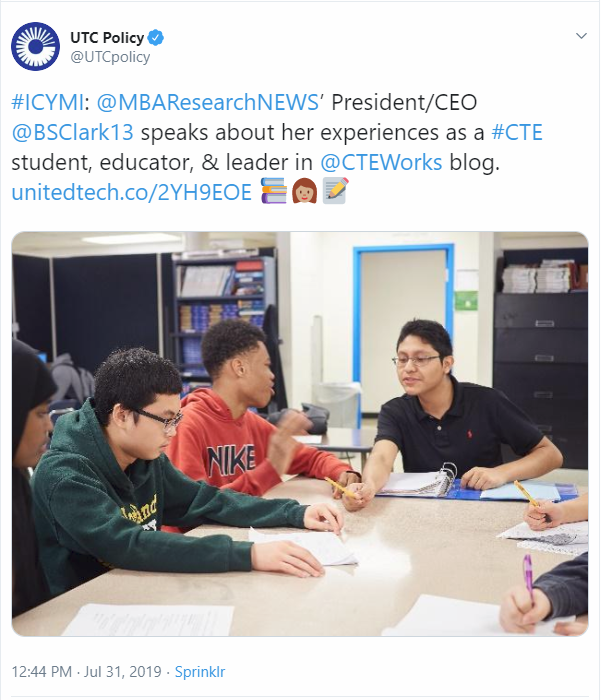TWEET OF THE WEEK
A true labor of love. Super proud of our @CedarRidgeHigh Graphic Design students, they professionally installed their designed mural! What a great learning opportunity for them! Next time you're at the Ridge, check it out! @RoundRockISD #realworldexperienceshappenhere pic.twitter.com/QpHYxeGb9E
— CedarRidge Academies (@academiesatcrhs) September 6, 2019
ANNOUNCEMENT OF THE WEEK
We’re Hiring!
Senior Associate, Member Engagement & Professional Learning
Advance CTE is hiring a Senior Associate, Member Engagement & Professional Learning who will be responsible for coordinating outreach and engagement with Advance CTE members, leading member-focused professional learning efforts, ensuring the organization is anticipating and meeting members’ needs, and helping to advance our organizational goals. This position has the unique opportunity to design and implement a strategy that engages education and workforce leaders from across the country both in-person and virtually.
The ideal candidate will be a problem solver, enjoy engaging directly with a range of individuals and be a team player committed to getting results in a fast-paced environment. This position provides an opportunity to have a direct impact on education policy by supporting state leaders working to ensure every student has access to high-quality Career Technical Education (CTE).
How to Apply: Please submit a cover letter, resume, two writing samples, a list of at least three professional references and salary requirements to careers@careertech.org by September 13, 2019. Learn more here.
VIDEO OF THE WEEK
The Dorsey Film program at Susan Miller Dorsey High School in CA is a 2019 Excellence in Action award winner in the Arts, A/V Technology & Communications Career Cluster®. Want to see the high-quality work these students produce check out their website here.
Here’s one example: https://youtu.be/vAt-MMyEJpU
RESOURCE OF THE WEEK
A new data explorer on Achieve’s Graduating Ready website dives into student outcomes and college and career readiness across the United States. The explorer compiles publicly-available state-reported data on student outcomes on eight different indicators of college and career readiness – including graduation rate, assessment proficiency, AP and dual enrollment, postsecondary enrollment, and more. The project shows that there remains much room for improvement in states’ public reporting in terms of breaking data down by student subgroups, reporting it in a timely manner, and in how students are counted. Check it out to see the information your state reports – and doesn’t.
Learn more here: https://highschool.achieve.org/college-and-career-ready-student-outcomes-data-explorer


